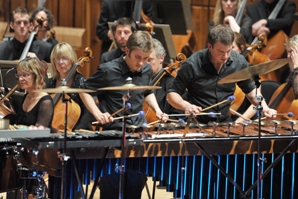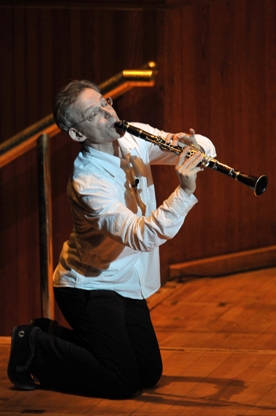BBC Symphony Orchestra 80th Birthday Concert, Barbican | reviews, news & interviews
BBC Symphony Orchestra 80th Birthday Concert, Barbican
BBC Symphony Orchestra 80th Birthday Concert, Barbican
Bread-and-butter Stravinsky wins the day in a well-stacked contemporary sandwich
Eighty years ago yesterday, the 41-year-old Adrian Boult launched the distinguished history of what was then a 114-strong BBC Symphony Orchestra with Wagner's Flying Dutchman Overture in Portland Place. Three months later ice-and-fire Ernest Ansermet was over to conduct Stravinsky's The Rite of Spring in a programme which included the composer at the piano. Both works were indispensible to last night's celebrations: crispbread and butter wrapped around an equally representative contemporary filling that spread its wow factor relatively thin.
Not that the live-wire soloists weren't hugely welcome. All three have given keynote performances in recent broadcasting history. Finnish clarinettist Kari Kriikku won a standing ovation with the premiere of Magnus Lindberg's lurid, crackling Clarinet Concerto; Olly Cox and Owen Gunnell of O Duo were in among the tongs and the bones for a roof-raising Proms performance of Xenakis's Pleiades two years ago which sent some in the stalls scuttling and shouting out in dismay while the rest of us sat riveted.
The Xenakis stoked almost as vivid and provocative a riot as the famous first performance of Stravinsky's Rite, even though it had been composed back in 1978. Stephen McNeff's ConcertO Duo was going to raise no such hackles at the 80th-birthday concert - indeed, how do you manage to make a rhythmic tour de force verge on the soporific? Chiefly by distributing the hardly memorable thematic invention among the large orchestra - my colleague Igor Toronyi-Lalic will be relieved to know that there was no Rautavaara syndrome of giving the melodies to the percussion "like some mad pet owner who believes his dog’s a daughter and has installed her in a dress" - and failing to engage it in a larger argument. This BBC/Borletti-Buitoni Trust commission has little chance of becoming a repertoire staple like James MacMillan's Veni, Veni, Emmanuel for Evelyn Glennie.
 So we drifted in and out of focus, sitting up when Cox and Gunnell duetted on bones or chased each other around the marimbaphone (pictured right) in a cadenza which had me wishing they'd have given us a half-hour improvisation instead. But then that wouldn't have involved the birthday orchestra, and at least there was an element of theatre as the two well-fit lads clapped, stamped, whistled and generally ran around with nimble tread.
So we drifted in and out of focus, sitting up when Cox and Gunnell duetted on bones or chased each other around the marimbaphone (pictured right) in a cadenza which had me wishing they'd have given us a half-hour improvisation instead. But then that wouldn't have involved the birthday orchestra, and at least there was an element of theatre as the two well-fit lads clapped, stamped, whistled and generally ran around with nimble tread.
How much would it have cost to hire a choreographer for O Duo, I wonder? Kaija Saariaho's D'OM LE VRAI SENS got a director, and a distinguished one at that in the shape of the ever-quiffed Peter Sellars. But from where I was sitting upstairs, his work was mostly in vain. Kriikku was invisible at the start and finish, and merely trotted round being and playing the unicorn of the Cluny Museum tapestries in a spotlight that kept slipping against a screen that changed colour for each of the five senses represented. Money not so well spent would have to be the verdict at a time when we're looking to see where deserving publicly funded bodies like the BBCSO are splashing around their cash.
 Isn't it a worry when mention of a composer's "soundworld" usually comes first? Saariaho is always about process, becoming, refinement, and while you wait for the strong ideas to emerge, her personal tapestry slips into the background as a kind of aural wallpaper, albeit with some pretty patterns. It needs a staging and a performance of the dedication of ENO's for L'amour de loin, or an artist of Kriikku's calibre (pictured left) to pull it up front. As he compellingly did with his shrieking overtones and oscillations at the start, and in the most haunting movement, the cumulative "A mon seul desir" which Saariaho sees as her stripping down to the essence, and in which all but the front desks of violins follow their unicorned pied piper off stage against a high bell ticking into infinity.
Isn't it a worry when mention of a composer's "soundworld" usually comes first? Saariaho is always about process, becoming, refinement, and while you wait for the strong ideas to emerge, her personal tapestry slips into the background as a kind of aural wallpaper, albeit with some pretty patterns. It needs a staging and a performance of the dedication of ENO's for L'amour de loin, or an artist of Kriikku's calibre (pictured left) to pull it up front. As he compellingly did with his shrieking overtones and oscillations at the start, and in the most haunting movement, the cumulative "A mon seul desir" which Saariaho sees as her stripping down to the essence, and in which all but the front desks of violins follow their unicorned pied piper off stage against a high bell ticking into infinity.
That they were mostly glamorous ladies, like the Cluny dame à la licorne, could hardly help making an impact when we'd been treated to films of the BBCSO's various principal conductors. Not a woman in eyeshot until we got to Dame Myra Hess and then - well, quite a sight, let's say, but what a light and spellbinding touch. This was a neat little sequence, well segued in excellent sound and parcelled into two sessions presented by an enthusiastic Christopher Cook (you can see the entire film below).
Whether Boult would have got quite the hair-raising sound at that 1930 leap into space with Wagner's Flying Dutchman that we heard last night from flaming strings and full-throated horns I doubt. Principal Guest Conductor David Robertson and his orchestra had apparently had to work very hard indeed on a piece which had been out of the repertoire for a long time and was, as a cellist who visited my class linked to the orchestra on Tuesday pointed out, "very note-y".
As indeed was the last work in another of the orchestra's killer programmes, but that at least was terra firma. Stravinsky's Rite of Spring is a work the BBCSO could play in its sleep - fortunately not the case in Robertson's incisive, clear and spacious reading. Graham Sheen's rather relaxed and lovely opening bassoon solo set the tone for the high quotient of song Robertson found in the piece. The horns carried on their blood-curdling work, the fabulous Helen Vollam was back at the head of the trombones - there's a world phenomenon I bet they wouldn't have anticipated in 1930 - and the strings showed how all the subtle work they do in splinter chamber groups such as the ones who come to the City Lit has paid off.
In fact the rounded phrases of divided violas were so typical of the finish in the performance as a whole. Every transition was smoothly or firmly rendered; climaxes had definition as well as terror. In fact all that the performance lacked was the heady atmosphere and the danger of the last time I heard this orchestra play the Rite - and that was under Gergiev. Robertson gave us a true concerto for an orchestra in peak form instead: hardly a fault under the circumstances. Many happy returns.
Watch the specially made film of all the BBCSO's principal conductors in action:
- Details of further concerts in the season on the BBCSO's webpage
- Kari Kriikku plays the Lindberg Clarinet Concerto on Amazon
- Catch the concert broadcast on BBC Radio 3 on Wednesday 27 October at 7.00pm
- See what's on at the Barbican this season
Share this article
more Classical music
 Bell, Perahia, ASMF Chamber Ensemble, Wigmore Hall review - joy in teamwork
A great pianist re-emerges in Schumann, but Beamish and Mendelssohn take the palm
Bell, Perahia, ASMF Chamber Ensemble, Wigmore Hall review - joy in teamwork
A great pianist re-emerges in Schumann, but Beamish and Mendelssohn take the palm
 First Persons: composers Colin Alexander and Héloïse Werner on fantasy in guided improvisation
On five new works allowing an element of freedom in the performance
First Persons: composers Colin Alexander and Héloïse Werner on fantasy in guided improvisation
On five new works allowing an element of freedom in the performance
 First Person: Leeds Lieder Festival director and pianist Joseph Middleton on a beloved organisation back from the brink
Arts Council funding restored after the blow of 2023, new paths are being forged
First Person: Leeds Lieder Festival director and pianist Joseph Middleton on a beloved organisation back from the brink
Arts Council funding restored after the blow of 2023, new paths are being forged
 Classical CDs: Nymphs, magots and buckgoats
Epic symphonies, popular music from 17th century London and an engrossing tribute to a great Spanish pianist
Classical CDs: Nymphs, magots and buckgoats
Epic symphonies, popular music from 17th century London and an engrossing tribute to a great Spanish pianist
 Sheku Kanneh-Mason, Philharmonia Chorus, RPO, Petrenko, RFH review - poetic cello, blazing chorus
Atmospheric Elgar and Weinberg, but Rachmaninov's 'The Bells' takes the palm
Sheku Kanneh-Mason, Philharmonia Chorus, RPO, Petrenko, RFH review - poetic cello, blazing chorus
Atmospheric Elgar and Weinberg, but Rachmaninov's 'The Bells' takes the palm
 Daphnis et Chloé, Tenebrae, LSO, Pappano, Barbican review - lighting up Ravel’s ‘choreographic symphony’
All details outstanding in the lavish canvas of a giant masterpiece
Daphnis et Chloé, Tenebrae, LSO, Pappano, Barbican review - lighting up Ravel’s ‘choreographic symphony’
All details outstanding in the lavish canvas of a giant masterpiece
 Goldscheider, Spence, Britten Sinfonia, Milton Court review - heroic evening songs and a jolly horn ramble
Direct, cheerful new concerto by Huw Watkins, but the programme didn’t quite cohere
Goldscheider, Spence, Britten Sinfonia, Milton Court review - heroic evening songs and a jolly horn ramble
Direct, cheerful new concerto by Huw Watkins, but the programme didn’t quite cohere
 Marwood, Power, Watkins, Hallé, Adès, Bridgewater Hall, Manchester review - sonic adventure and luxuriance
Premiere of a mesmeric piece from composer Oliver Leith
Marwood, Power, Watkins, Hallé, Adès, Bridgewater Hall, Manchester review - sonic adventure and luxuriance
Premiere of a mesmeric piece from composer Oliver Leith
 Elmore String Quartet, Kings Place review - impressive playing from an emerging group
A new work holds its own alongside acknowledged masterpieces
Elmore String Quartet, Kings Place review - impressive playing from an emerging group
A new work holds its own alongside acknowledged masterpieces
 Gilliver, LSO, Roth, Barbican review - the future is bright
Vivid engagement in fresh works by young British composers, and an orchestra on form
Gilliver, LSO, Roth, Barbican review - the future is bright
Vivid engagement in fresh works by young British composers, and an orchestra on form
 Josefowicz, LPO, Järvi, RFH review - friendly monsters
Mighty but accessible Bruckner from a peerless interpreter
Josefowicz, LPO, Järvi, RFH review - friendly monsters
Mighty but accessible Bruckner from a peerless interpreter
 Cargill, Kantos Chamber Choir, Manchester Camerata, Menezes, Stoller Hall, Manchester review - imagination and star quality
Choral-orchestral collaboration is set for great things
Cargill, Kantos Chamber Choir, Manchester Camerata, Menezes, Stoller Hall, Manchester review - imagination and star quality
Choral-orchestral collaboration is set for great things

Add comment